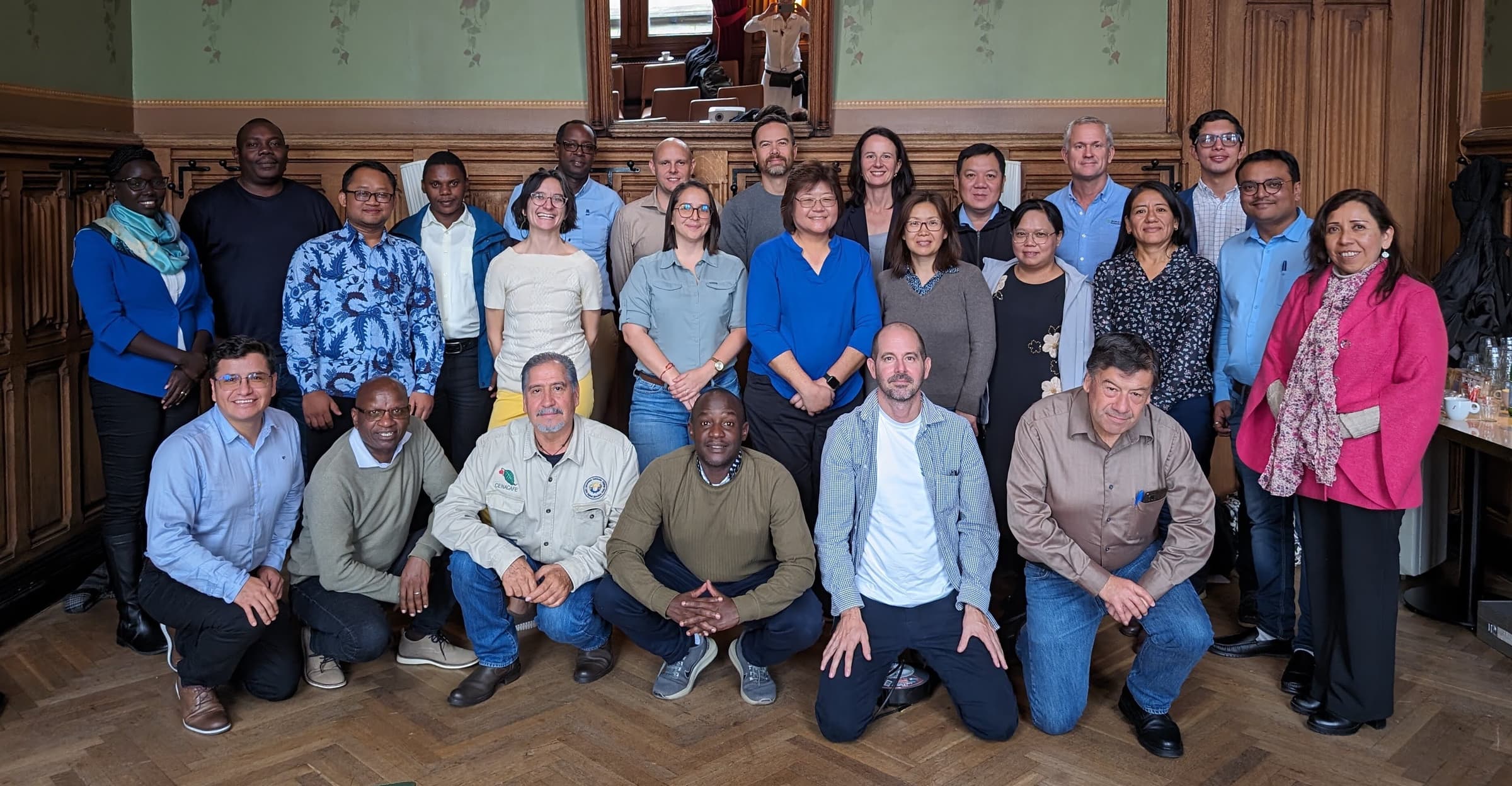Forging the future of coffee—together
An update on how the Innovea Global Breeding Network is driving change through strategic, global collaboration
Note: This article is also available in Japanese. Please click here to download the Japanese version.
In November 2023, World Coffee Research (WCR) gathered coffee breeders from 9 countries around the world for a meeting in Amsterdam to convene around the ongoing work of the Innovea Global Arabica Breeding Network, the world’s most ambitious coffee breeding initiative in recent history. The Innovea breeders—from Costa Rica, Mexico, Peru, the United States, India, Indonesia, Rwanda, Uganda, and Kenya—along with guests from Vietnam and WCR staff are now being featured in a new video through which they explain the transformative opportunity being provided by the network for coffee research programs worldwide. For a full list of participants featured in this video, please see below.
“Coffee is an incredible beverage that unites millions of people around the world,” explains Hanna Nesuchwander, WCR’s Director of Strategy and Communications, “In order to sustain that, we need to make improvements in how coffee breeding is done. And one of the most important things we can do is bring together countries to collaborate…to make faster progress.” This collaborative, multinational approach is central to the design of the Innovea network, as working together enables coffee-producing countries to pursue continuous and accelerated development of higher-performing coffee varieties tailored to the unique needs of their respective farmers and markets.
According to Dr. Tania Humphrey, WCR’s Director of Research & Development, November’s meeting in Amsterdam showcased exactly how important this coordinated approach is in forging the future of coffee. “We’re all working together in a very coordinated way to evaluate the same genetic material in many different environments in many countries around the world,” explained Dr. Tania Humphrey of WCR, “[WCR] is globally oriented and we absolutely have a vested interest in seeing many diverse origins of supply to continue to succeed.”

Innovea Global Breeding Network partners and WCR staff convene in Amsterdam, 2023.
Facilitating change across borders
The Innovea Network—which gives participating countries access to new genetic materials, modern breeding approaches, and shared tools all while connecting researchers across vast geographies—aims to produce results that would not otherwise be possible for more traditional programs working in isolation within the borders of a single country. “For us, it’s important for new varieties in our system because it’s going to diversify the genotype we have in our country. These new genotypes could help us to face the changing environment and several extreme conditions that we may face in the future,” said Dr. Dina Gutierrez, Director of the Biotechnology Subdirectorate of Peru’s Instituto Nacional de Innovación de Agraria (INIA).
Given the timelines for breeding a tree crop like coffee and the reality of the climate crisis, using modern breeding tools is essential to ensure a more sustainable future for the industry. “There are definitely climate change and associated ecosystem changes,” said Dr. Elijah Gichuru, Director of the Kenya Agricultural and Livestock Research Organization (KALRO)’s Coffee Research Institute, “Innovea facilitates the assessment of breeding materials—and what is being bred to be assessed in very wide areas—which addresses the potential with real climate change parameters so that the outputs are more informed and we have better varieties to serve the industry.”
Carrying out the legacy of the coffee sector
What the future will bring is certainly front-of-mind for the Innovea partners and WCR staff alike, but it is clear for all involved that the network has carved out a special opportunity for scientists to meet the ever-evolving challenges facing producing countries and farmers worldwide. “Most of the coffee-growing countries have done tremendous work in the coffee sector, and bringing them all together in one platform is very, very essential,” said Dr. Shivalingu BR, Researcher at the Central Coffee Research Institute of India, “Innovea is fundamental, indispensable, [and] vital…to the coffee industry, especially to carry out the legacy and the requirement and demand of the coffee sector.”
Looking ahead, in 2024, there are several milestones that the Network has set out to achieve—including completing the seed distribution to all participating countries, genotyping of seedlings to verify hybridity, and getting plants into fields in 7 out of 9 countries across Latin America and Africa—as they work together to achieve significant genetic gain for coffee and forge a brighter path forward for the industry at large.
In order of appearance, those featured in this video include:
- Hanna Neuschwander, Director of Strategy and Communications, World Coffee Research
- Nick Muir, former Breeding Manager, World Coffee Research
- Dr. Santos Barrera, Research Scientist in Breeding and Genomics, World Coffee Research
- Dr. Tania Humphrey, Director of Research & Development, World Coffee Research
- Dr. Dina Gutierrez, Director of the Biotechnology Subdirectorate, Instituto Nacional de Innovación de Agraria, Peru
- Dr. Esteban Escamilla, Professor and Researcher, Universidad Autónoma Chapingo, Mexico
- Ari Wibowo, Coffee Breeder, Indonesian Coffee and Cocoa Research Institute
- Dr. Jane Cheserek, Plant Breeder, Kenya Agricultural and Livestock Research Organization’s Coffee Research Institute
- Dr. Shivalingu BR, Researcher, Central Coffee Research Institute, India
- Dr. Elijah Gichuru, Director, Kenya Agricultural and Livestock Research Organization’s Coffee Research Institute
- Carlos Acuña, Genetic Improvement Program Coordinator, Instituto del Café de Costa Rica
- Dr. Godfrey Sseremba, Leader and Senior Research Officer of the Coffee and Cocoa Variety Improvement Management Programme, Uganda National Coffee Research Institute
Japanese version
JPN Forging the future of coffee
Download to read a Japanese translation of this article